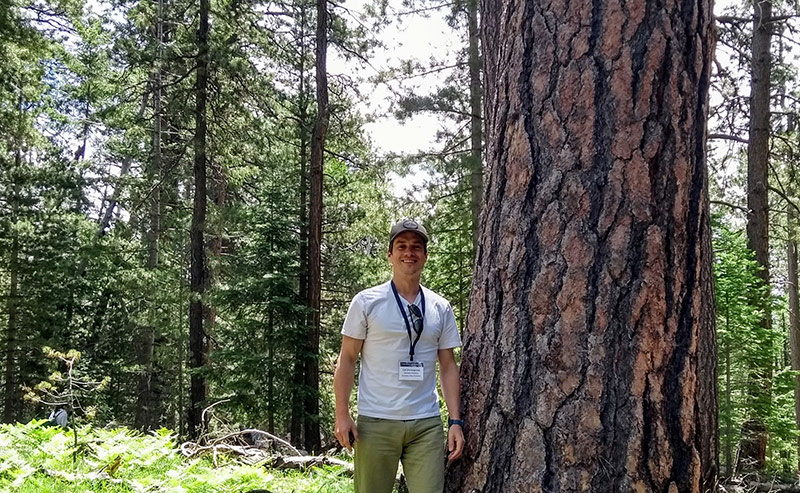Cultivating tomorrow's forests: UNB researcher helping grow silviculture knowledge for a more sustainable future
Author: UNB Newsroom
Posted on Feb 8, 2021
Category: UNB Fredericton

Researchers from the University of New Brunswick will be part of a five-year, $5.1-million cross-Canada project advancing science and innovation in silviculture.
The Silva21 collaborative initiative builds on existing national efforts to bring together stakeholders from governments, communities, industries and universities, with a goal of improving knowledge, approaches and tools in forest management.
Led by Dr. Alexis Achim at Université Laval, the project includes one Indigenous community, five post-secondary institutions, five forest companies, five provincial government agencies and two national research organizations.
Dr. Loïc D’Orangeville, an associate professor of tree biology and silvics in the UNB Fredericton faculty of forestry and environmental management, will lead UNB’s participation in this project. In addition to representing Atlantic Canada in the overall initiative, Dr. D’Orangeville will lead the establishment of TransEx, a network of long-term trials in Eastern Canada and the United States, exploring how different species adapt to changing climates.
“The forest is part of so many people’s lives here and there is a real need for a research initiative to better prepare us all for the important changes to come with climate change,” said Dr. D’Orangeville. “My hope is that this network of sites ranging from Atlantic Canada to North Carolina becomes a long-term research platform for climate change research.”
Silva21 will address 38 research questions to help silviculture practices be more resilient in a changing world marked by increasing climatic and economic uncertainty.
Anticipated research outcomes include ensuring the accessibility and continuity of the wood fibre supply, better understanding the impacts of climate change on timber availability and access, and implementing adaptive, socially aware silvicultural and forest management measures to ensure a viable and sustainable forest industry through the 21st century. Ultimately, the research team seeks to mobilize their research and knowledge to provide tools and practical solutions for decision-makers, managers and planners across the country.
“Dr. D’Orangeville and his colleagues’ commitment to a modern and sustainable silviculture exemplifies how research contributes to a positive ecological and economic future for Canada,” said Dr. David MaGee, UNB’s vice-president (research). “It’s a prime example of UNB’s international impact and of our commitment to a better future.”
The project is funded by NSERC’s Alliance Grants program, which will provide more than $3.4 million over five years, starting in 2020. An additional $1.7 million will come from contributing partner organizations and $40,000 from the participating post-secondary institutions.
“Congratulations to all Alliance grant recipients,” said Marc Fortin, vice-president, research partnerships, NSERC. “The overwhelming response has shown that Alliance’s responsive and flexible design is just what researchers and their partners are looking for. The ability to build unique collaborations with a broader range of partners is allowing these teams to better address key challenges that are a priority for Canada.”
The funding will support all aspects of the project, including a robust knowledge dissemination program, fieldwork, and funding for 28 graduate student research positions, six postdoctoral fellowships, a six-person research staff, and ten undergraduate student assistantships across the five universities. Of those, four graduate students and one research associate will be based at UNB, with an additional four summer undergraduate student opportunities offered this year.
These will provide opportunities for students and early-career researchers to gain valuable research skills through training and mentorship, contributing to increasing research expertise and capacity in silviculture.
The project team began initial activities in January, and Dr. D’Orangeville will begin developing the TransEx migration trial network shortly thereafter. The research project will continue through 2025.
Media contact: Jeremy Elder-Jubelin
